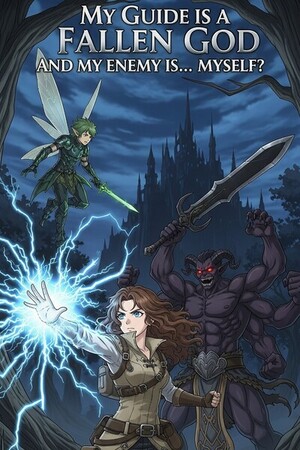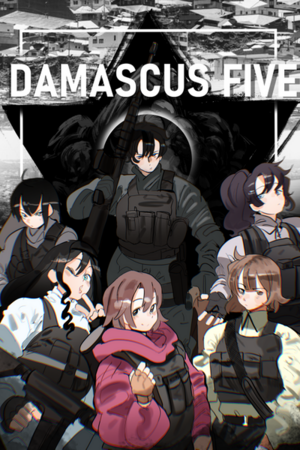Chapter 34:
A Song to Summon the Wisps
My Guide is a Fallen God and My Enemy is... Myself?
In the dead of night, the vast heart of Kaur-Koram beat a silent, slumbering rhythm. The castle itself seemed a dormant creature, its stone veins running cold and still, the lifeblood of its courtiers and councillors quiescent in their chambers. A profound stillness held dominion, punctuated only by the solitary, metronomic tread of the night watch. Clad in armour, they patrolled the ramparts and corridors, the lone guardians of the sleeping populace within the Light Alliance’s most vital stronghold. Yet, in the immense and echoing quiet, one soul stubbornly refused the solace of sleep.
The only sound that answered the silence was the hollow, melancholic cadence of Blynn’s cloven hooves upon the marble floors. Sleep had become a stranger to him the moment he passed within the castle’s formidable walls, a comfort he could no longer recall. He was an interloper in this world of polished stone and gilded ceilings; its luxury was a cold, suffocating finery that offered no warmth. These nocturnal wanderings were his defiant answer to the creeping tendrils of insomnia, a way to absorb the castle in its most vulnerable state, to learn its sights, its sounds, its very scent. Washed in the ethereal glow of moonlight, the grand corridors were transformed from their daytime magnificence into something far more ancient and mysterious, their lengths becoming conduits of silver and shadow.
On this particular night, his restless pacing carried him down a passage he had not traversed before. Its walls were draped in magnificent tapestries, woven chronicles of histories, myths, and traditions from ages long forgotten. The deeper he walked, the older the woven scenes became, their threads growing sparser, their once-brilliant pigments faded to faint ghosts of former glory. He finally came to a halt before one so ancient and frayed that its colours had dissolved into a spectral haze. At its center was a form of purest white, an ambiguous shape that might have been a forgotten deity, a mythical beast, or a snow-crowned peak. He made a silent promise to himself to return in the daylight, to see if the sun could coax any further secrets from the desiccated threads. It was then that a new sound joined his own—a series of deliberate, quiet footfalls approaching from the gloom.
His body went rigid as he turned. It was the elder Satyri, Aria. Her hooves, rounder than his own, produced a deeper, more resonant note on the marble. With a quiet, scholarly reverence, her gaze drifted across the tapestries as she passed. Without a word, she stopped beside Blynn, her eyes fixed on the same faded masterpiece. A frantic current of anxiety coursed through him, but he forced his gaze back to the tapestry. He was trapped.
Ever since his arrival at Kaur-Koram, he had made a conscious, careful effort to evade her, a strategy that, until this moment, had proven successful. Now, cornered in the narrow, silent hall, he could see no polite means of escape, no plausible excuse to depart that would not be a clear and deliberate slight.
For a long, tense moment, they stood in shared stillness, and the quiet between them felt heavier than the stone walls around them, freighted with all that had been left unsaid. It was Aria who finally fractured the silence.
“Blynn, why have you been avoiding me?” Her voice was level, yet the question landed with undeniable weight.
Blynn fought a powerful urge to shuffle his feet, to turn away. “I… I haven’t been avoiding you, Ari,” he managed, the flimsy lie sounding small and thin in the reverberating hall.
Her snort, brief and dry, startled him with its uncanny resemblance to Malakor’s. “Blynn, I am not a fool. Do not insult my intelligence to my face.”
His head slumped in defeat, a sigh of weary resignation escaping him. In a protective, instinctual gesture, his hands rose to clutch his upper arms. This was the one conversation he had dreaded above all others. “I just…” he began, his voice dropping to a near-whisper. “I didn’t want you to see me like this. I didn’t want your pity. Or your sympathy. Or any of it.” He risked a sideways glance at her. “It’s better if you just remember me as I was, without… all this.” He absently traced the gnarled, twisted landscape of scars that marred half his face. Even after all this time, the texture of that mangled flesh made him recoil internally with revulsion.
His confession hung in the air, the raw vulnerability of it quickly souring into anxious dread as he awaited her judgment. But for a long moment, Aria remained silent. When she finally spoke, her words were simple and direct.
“Blynn, I do not pity you.”
“Why?” The word erupted from him. He wheeled to face her, his eyes blazing with a frantic, furious light as his lips pulled back from his teeth in a snarl. “Why not? Look at me, Aria! For pity’s sake, listen to me!” His voice, rather than rising in volume, cracked with anguish and stretched into a higher, strained pitch as he yelled. “I cannot sing! My voice is ruined! What is left of my pride as a Satyri?”
His outburst was cut short, ruthlessly. Aria’s hand shot out and cuffed him hard on the back of the head. The blow was sharp enough to make him stagger forward, the shock of it so complete and unexpected that it stole his breath and his words. He stared up at her, his eyes wide with disbelief.
“What pride?” she repeated, her voice suddenly imbued with a force that resonated through the hall. “You ask what Satyri pride you have left? Though your vocal cords are damaged, do your hands not work, Blynn? Is your breath gone from your lungs? Your pride was never just your song. We have other arts, other magics, other prides in our people, despite what you were taught as a child.”
With a firm, decisive tug, Aria lifted a wooden flute from a cord around her neck and thrust it toward him. “Play.”
Blynn stared at the simple instrument as if it were a venomous snake. Back in his clan, before the fire, before the branding, before the scars, his voice had been the stuff of legend. He could sing the birds from the trees without effort. It was said that the spirits of the dead would pause in their grieving to listen to his song. He was a Satyri of phenomenal, fearsome talent before he became this broken thing that answered to the name “Blynn.” And he had known it. When the flames stole that gift and left his throat a ruin of scar tissue, a terrible despair had claimed him. For a Satyri, the voice was the soul made manifest. One whose voice was too ravaged to sing was a pariah. They drew their power from song, from music. For Blynn, who had been the greatest among them, losing his voice was a sentence worse than death.
With a trembling hand, he reached out, his scarred fingers closing around the familiar, smooth wood. He raised the flute to his lips.
An expectant silence fell over the hall, so profound it seemed the ancient stones themselves were holding their breath. Blynn paused, his fingers hovering over the holes, his lips brushing the mouthpiece.
Then, he began to play.
A liquid melody spilled into the night, a current of beautiful, invisible sound that seemed to wash the very dust from the air. The notes, shaped by the dance of his fingers and the skill of his breath, flowed out of him, and the hall that had only known his lonely footsteps and agonized cries now seemed to hold and cradle the music. In the deep shadows, Aria listened, her eyes glistening like trapped stars in the moonlight.
Slowly, they became aware they were no longer alone. In the darkness, tiny points of shimmering light appeared, at first blinking timidly. They drifted toward Blynn, drawn by the irresistible tide of his music. More and more of the small, luminous orbs materialized, their numbers swelling until they formed a silent, swirling galaxy around him, darting and weaving in a complex, joyous ballet timed to his melody. Had one’s ears been sharp enough, they might have caught faint, tinkling notes emanating from the lights—the chime of tiny silver bells, the sound of a child’s laughter.
Blynn let the song conclude on one long, tapering note, allowing the sound to fade slowly, to cling to the air like a phantom perfume. He lowered the flute and let out a single, cleansing breath. Opening his eyes, he saw the wisps still floating and circling around him, and a small, genuine smile touched his lips. He extended his scarred palm, and one or two of the lights would alight on the ruined skin for a fleeting moment, a touch of pure magic upon his mark of pain, before darting away to make room for another. The music was gone, but its echo seemed to resonate deep within the very bones of the stone.
“You always had a connection to the wisps,” Aria said at last, breaking the enchanted quiet.
Blynn gave a soft snort and waved a hand, dismissing the luminous spirits. With a final, regretful-sounding jingle, they vanished back into the nothingness from which they had come. “Perhaps, but what does it matter? Here.” He offered the flute back to Aria, but she simply shook her head.
“No,” she said, her voice firm. “You should keep it.” She turned away, and the sound of her hooves receded down the hall. Her final words, freighted with meaning, drifted back to him. “You are going to need it.”




Please sign in to leave a comment.